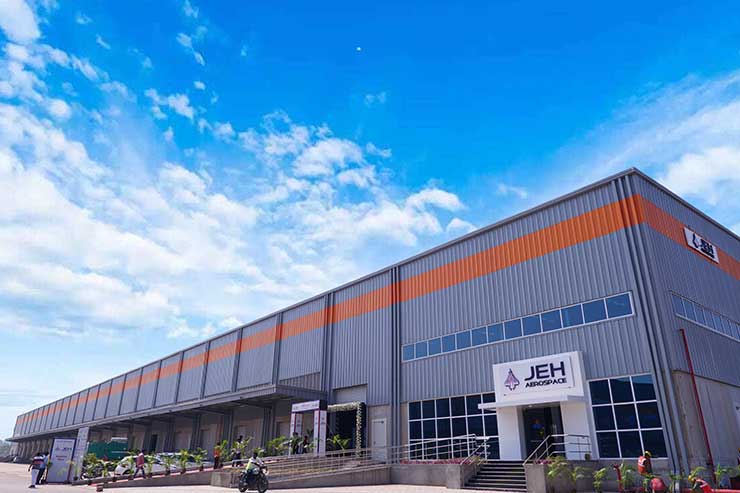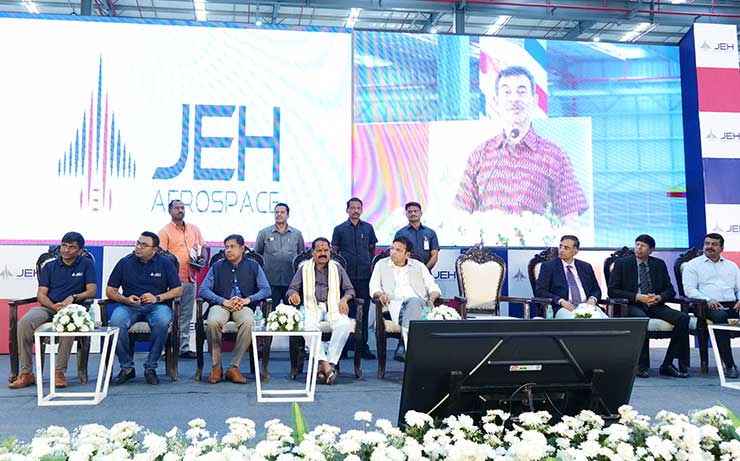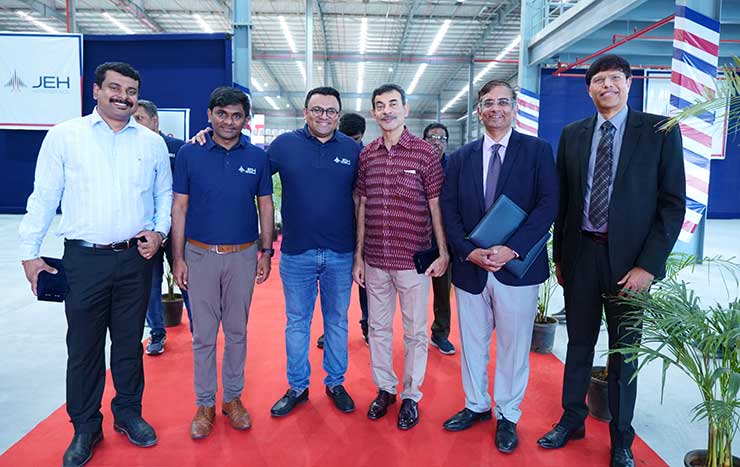Building resilience by leveraging India’s capabilities for the larger world forms the bedrock of Jeh Aerospace’s mission, aiming to usher in a paradigm shift in the aerospace industry’s mindset and operational approach. Vishal R Sanghavi and Venkatesh Mudragalla, Co-founders of Jeh Aerospace, shared their insights with Editor of Raksha Anirveda, offering a glimpse into the realities, strategies, and aspirations shaping the trajectory of their venture, and the pragmatic approach driving their brainchild forward. Excerpts…
Vishal R Sanghavi and Venkatesh Mudragalla, the dynamic duo behind the burgeoning start-up Jeh Aerospace, bring to the table a wealth of experience garnered during their tenures within the prestigious Tata Group. Vishal, notably, held the distinction of being one of the youngest CXOs within the Tata conglomerate. Together, they embark on a mission to propel Jeh Aerospace into the forefront of the global aerospace industry, harnessing India’s aerospace capabilities to foster a resilient, responsible, and resourceful supply chain.
Their journey into entrepreneurship stems from a profound observation of the aerospace landscape. “Venky and I had dedicated our careers to Tata,” Vishal reflects, “Navigating a business turnover of US$100 million across various sectors provided us with a panoramic view of the market.” Amidst this vista, they discerned a vast expanse of untapped potential. “What we saw was a huge undeveloped market,” Venkatesh chimes in, “with immense opportunities.” It was a realisation that germinated the seeds of Jeh Aerospace, envisioning a platform where Indian aerospace capability could be harnessed to cater to the demands of the industry.
It’s not just about India’s advantages; Vishal and Venkatesh are keenly aware of the strengths they bring to the table as well. “The kind of experience that Venky and I have been through and delivered at the highest level,” Vishal emphasises, “adds another layer of credibility to our endeavour.”
Yet, the transition from corporate giants to an entrepreneurial trailblazer was not devoid of trepidation. “Yes, it was scary to take a decision to move into a start-up,” Vishal admits candidly. The allure of venturing into uncharted territory was tempered by the uncertainties that accompany any entrepreneurial endeavour. Yet, it was precisely this blend of apprehension and audacity that propelled them forward, fuelling their determination to carve out a niche for Jeh Aerospace in the competitive aerospace domain.
Forging resilience lies at the heart of Jeh Aerospace’s business ethos, a response to the tumultuous events that have shaken the aerospace industry in recent years. “If you observe the aerospace industry, there were two major events that sent shockwaves across the sector,” Vishal begins, referencing the 737 Max crash and subsequent fleet grounding, followed by the disruptive impact of the Covid-19 pandemic. “The airline and aerospace industries bore the brunt of these crises,” Venkatesh interjects, highlighting the vulnerability of suppliers, especially small and medium-sized enterprises, unable to weather the storm.

“In the aftermath,” Vishal continues, “we witnessed resurgence in demand, but the supply remained constrained.” The imbalance between soaring demand and crippled supply chains underscored the pressing need for resilience. “Effectiveness took precedence over efficiency,” he notes, drawing an analogy to catching a flight where timeliness trumps cost efficiency. “It’s about being there to catch the flight,” Venkatesh adds, emphasising the importance of prioritising effectiveness over mere efficiency.
This ethos forms the bedrock of Jeh Aerospace’s mission – to usher in a paradigm shift in the aerospace industry’s mindset and operational approach. “Aerospace manufacturing, unlike automotive or industrial manufacturing, is largely concentrated in high-cost Western countries,” Vishal elucidates. Herein lies India’s advantage: abundant labour and engineering talent, coupled with low cost and stable inflation rates, present an attractive proposition for global aerospace players grappling with labour shortages and inflationary pressures. “Our aim,” Vishal concludes, “is to harness India’s capabilities to build supply resilience on a global scale.”
But it’s not just about India’s advantages; Vishal and Venkatesh are keenly aware of the strengths they bring to the table as well. “The kind of experience that Venky and I have been through and delivered at the highest level,” Vishal emphasises, “adds another layer of credibility to our endeavour.” Their track record of success with the Tata Group’s JVs and partnerships with marquee OEMs like Boeing, Lockheed Martin, Sikorsky, and GE speaks volumes about their ability to navigate complex challenges and deliver results. Furthermore, geopolitical dynamics play a role in shaping Jeh Aerospace’s strategy. “In a way, China is helping us without us doing anything,” Vishal notes. With global tensions and uncertainties surrounding manufacturing in China, there’s a growing appetite for alternative sourcing destinations, positioning India as a favourable option for aerospace manufacturing. “All these factors contribute to our vision of building resilience by leveraging India’s capabilities for the larger world,” Vishal observes.

In response to the question about Jeh Aerospace’s focus on the US-India corridor, Vishal clarifies, “No sir, it’s all about strategy and market dynamics”. “You can do a lot of things, but if you try to run a start-up without focus, you’ll end up going nowhere,” he explains. “So, we’ve identified our niche: aerospace, whether it’s defence or commercial aircraft. Within that, we’re targeting tier two and tier three companies because that’s an underserved market.”
He goes on to elaborate on their product focus, stating, “We’re specialising in aero-engines and aero-structures products because that’s where our expertise lies, honed over the last 10 to 12 years.” Geographic considerations also play a crucial role in their strategy. “By far, the US has the largest aerospace industry and hence the largest markets,” Vishal points out. “It’s also one of the most entrepreneurial markets, always eager to explore global opportunities. That’s why we’ve established a presence in the US, making the US-India corridor a key focus area for us.”
However, this doesn’t mean they neglect other regions. “It doesn’t mean we aren’t in Western Europe,” Vishal clarifies. “There may be some customers there, but to avoid spreading ourselves too thin, we’ve chosen to prioritise the Indo-US corridor, given its longstanding relationship spanning decades.”
Reflecting on their early days, Venkatesh shares insights into their journey. “When we started, we had no one,” he admits. “Coming from Tata’s, where you have ample resources and support, transitioning to our own venture was challenging.” They had a vision but soon realised the importance of adapting to market needs. “We had to pivot constantly to align with market demands,” Venkatesh explains. Despite the initial hurdles, their perseverance paid off. “We managed to secure a couple of significant contracts, which is no small feat in this industry,” he adds. “It took time, but our resourcefulness and dedication eventually bore fruit.”
When asked about their sales approach, Vishal reveals, “We directly supply to our customers. Certain items are manufactured in our facility, but we’re also fostering relationships within the Indian supply chain.” He adds, “We’ve built a network of suppliers whom we collaborate with, both for sourcing materials and supplying to our customers. Our role comes into play primarily at the front end and the last mile.”
When asked about their sales approach, Vishal reveals, “We directly supply to our customers. Certain items are manufactured in our facility, but we’re also fostering relationships within the Indian supply chain.”
Elaborating further, Vishal explains their role in the process, stating, “At the front end, we demystify what we call manufacturing engineering. Essentially, we take a drawing or document that outlines the manufacturing process for the final part. This is where we add value by ensuring clarity and efficiency in production.” He emphasises their commitment to quality assurance, saying, “At the last mile, we ensure that the quality meets the exact standards our customers require. Our credibility hinges on this, and we take it very seriously.”
Moving on to their operational facilities, Venkatesh provides an update. “We initially started with a small facility, but we’ve since expanded to a larger one,” he reveals. He shares insights into their facility setup in Hyderabad. “We’re establishing a world-class facility with capabilities to deliver aircraft components for global requirements,” he notes. “The new facility has been inaugurated, and everything is in place. Production is scheduled to commence by July 2024, and we will begin delivering components for US manufacturers from early August this year,” he adds, highlighting their readiness to scale up their operations and meet the demands of their growing clientele.
“I don’t want to get into revenue numbers because it is always sensitive,” Vishal responds when asked about the business outlook for 2024-25. “But based on what we have, with a team of 100 people by the end of this financial year, it’s significant for a start-up and for this industry to achieve this in such a short time,” he adds. “It’s backed by the demand and orders that we already have, so we’re not just dreaming it up.”
Looking ahead, Vishal outlines an ambitious target for the next five to seven years. “In the next five years, we definitely have a big target – to be somewhere around US$100 million,” he states. “But it’s important to clarify that this isn’t just about revenue; it’s about achieving a profitable revenue of US$100 million, not burning money while making US$100 million. That’s our vision and where we want to be.”

Reflecting on the Indian government’s initiatives such as “Make in India” and “Atmanirbhar Bharat,” Vishal acknowledges their impact on the aerospace industry. “I’ve seen significant changes, especially in aerospace, during my time at the Tata Group,” he remarks. Comparing his experiences from the Tata-Lockheed venture in 2009 to the Tata-Boeing venture in 2016-19, Vishal observes notable improvements in both central and state government policies. “There’s been a transformation in ‘New India’ with respect to approvals and business environment,” he adds, expressing optimism about India’s potential to become a global hub in the aerospace industry in the coming five to seven years.
“There has been significant improvement in the right direction and in the right trajectory. If we continue to stay on that path, we will significantly improve, especially in the manufacturing industry because it is our time and because the world needs India,” he adds. Vishal emphasises the importance of government support, suggesting that schemes like the PLI scheme could be beneficial for industries, including aerospace manufacturing.
Reflecting on India’s potential to develop its own commercial aircraft, Vishal shares his perspective. “I’m not necessarily the most knowledgeable person on this subject, but I believe there are two main aspects to consider – manufacturing and market readiness,” he explains. He highlights India’s progress in defence aircraft production citing projects like Tejas. Besides, the Tata-Airbus C-295 collaboration and the F-414 engine deal that India has done with GE are also significant steps forward. Vishal also underscores the importance of respecting intellectual property rights and avoiding the replication of others’ designs unlike China, advocating for India to pursue its own path in aircraft development.
On the topic of engagement with Indian defence public sector undertakings (DPSUs) like Hindustan Aeronautics Limited (HAL), Vishal indicates they haven’t connected yet but remain open to meaningful opportunities. “Through Jeh Aerospace, we aim to make a dent in the world aerospace market and position India as a larger hub in the industry,” he asserts.
Regarding efforts to attract Original Equipment Manufacturer (OEMs) like Boeing and Airbus to setup Final Assembly Line in India, Vishal expresses optimism. “Steps are being taken in that direction,” he says. “OEMs like Airbus and Boeing are moving in that direction, and we wouldn’t be surprised to see tangible outcomes soon,” he adds.
In response to the potential for Indian companies to assist Boeing with quality issues and supplies, Vishal asserts that it is indeed possible, backed by the track record of entities like Jeh Aerospace. “We have delivered world-class products, and I’m confident in our capabilities,” he concludes, underlining their commitment to excellence in the aerospace industry.





